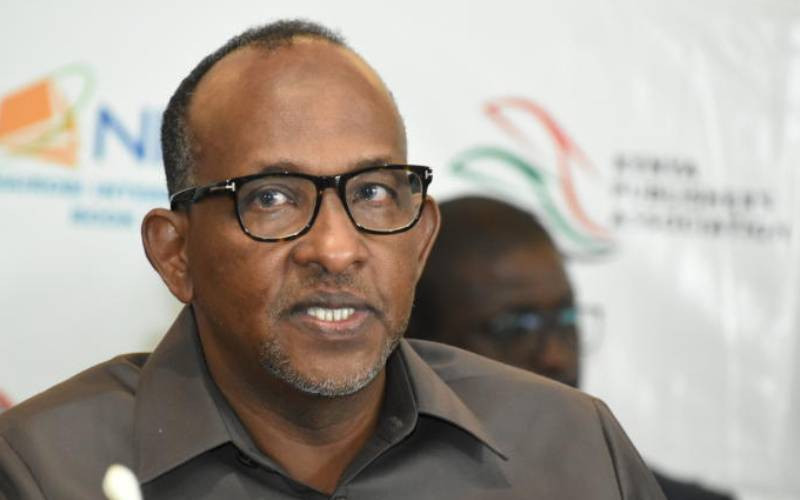It is not surprising in the year 2015 for the likes of Moses Kuria to emerge from nowhere and confess about the role they played during ICC investigation, identifying the nodes in architectural plan for evidence of post-election violence cases.
When Moreno Ocampo initially made his intention to arrest suspects responsible for election violence, nobody including Moses Kuria was willing or comfortable to volunteer any information. The mention of a secret envelope alone had a neutralizing effect across political divide, until the six pick was disclosed. Mr. Ocampo was not a handsome man either, he was a hairy mean faced fire breathing prosecutor who vowed to bring to justice those behind the senseless killing of some 1300 Kenyans.
As we know it, a list popularly known as Ocampo six didn't take too long before it was released. Soon thereafter, Hague slowly turned into a sort of retreat for the accused, who began regular travels to attend hearing of their cases. Eight years down the line, the cases have gone its full length, and only two, William Ruto and Sang still remain in the fight to prove their innocence.
A lot has changed from the days of Kalonzo Musyoka's shuttle diplomacy. Mr Ocampo was long replaced by Bensouda at the court and whereas Uhuru Kenyatta and William Ruto are leading the Executive in Kenya Government. The Ocampo six list also drastically reduced down to two. But with all these changes, what is fundamentally important is the realization of Kenya's political machinery in adapting to operational systems of the ICC that has significantly changed the way Kenya relates to the criminal court inside of it, and politicization of the process outside the court.
Through engagement with the court and political actors, Kenyan interlocutors have discovered the soft belly of ICC, as a shaky judicial institution whose operations largely depends on policies established by state parties and exploited the weaknesses of its structures. The prosecutor's awe, to project intimidating power is effectively deflated the minute defense teams achieved successes in defeating the prosecutor's strategy with regard to witness’s testimony and evidence management in the beginning phase of Kenyan cases.
Prosecutor Fatou Bensouda's laid back posture compared to Moreno Ocampos demeanor of a ruthless operator favored defense teams to put up a spirited fight accusations levelled against their clients more vigorously. One would hardly resist admiring expressive stamina of lead defense lawyer Karim Khan as he poked holes into prosecutor’s alibi mocking the inadequacy making comparison to a creature with a rotten underbelly.
It is no wonder therefore; individuals like Moses Kuria and ilk have lost respect for the stature and authority of ICC. I think they don't see any difference at all, between ICC and the Kenyan courts, because in both instances the cases drag on for too long and take eternity before they are determined.
The tragedy of this ceaseless circus is the neglect; abandonment of plight of the victims, whose right to get justice for the sins committed against them is delayed. They say justice delayed is justice denied. The people who bore the brunt of murderous, rapist, and arsonists need a form of closure to get relief from the critical stress inflicted during the commission of crime, and gross human rights violations in post-election violence. It is indeed telling that very few people if any, have been arrested and prosecuted to answer for the wide ranging crimes committed during post-election upheaval.
The government stands to benefit in preserving very delicate national unity and cohesion if it discouraged and bans polarizing political debate on the ongoing ICC cases. The scars and wounds of 2007/8 fallout are still fresh by and large. I have been there, and done it. I know the difficulty of cultivating peace when debauchery of lawlessness sets in. Our leaders must immediately get back to their senses and stop all these nonsense.
Major (Rtd) Mohamed Wato, is a political commentator and author of walking a Tight Rope amidst Post-election Violenc. Email: [email protected]
 The Standard Group Plc is a
multi-media organization with investments in media platforms spanning newspaper
print operations, television, radio broadcasting, digital and online services. The
Standard Group is recognized as a leading multi-media house in Kenya with a key
influence in matters of national and international interest.
The Standard Group Plc is a
multi-media organization with investments in media platforms spanning newspaper
print operations, television, radio broadcasting, digital and online services. The
Standard Group is recognized as a leading multi-media house in Kenya with a key
influence in matters of national and international interest.
 The Standard Group Plc is a
multi-media organization with investments in media platforms spanning newspaper
print operations, television, radio broadcasting, digital and online services. The
Standard Group is recognized as a leading multi-media house in Kenya with a key
influence in matters of national and international interest.
The Standard Group Plc is a
multi-media organization with investments in media platforms spanning newspaper
print operations, television, radio broadcasting, digital and online services. The
Standard Group is recognized as a leading multi-media house in Kenya with a key
influence in matters of national and international interest.






